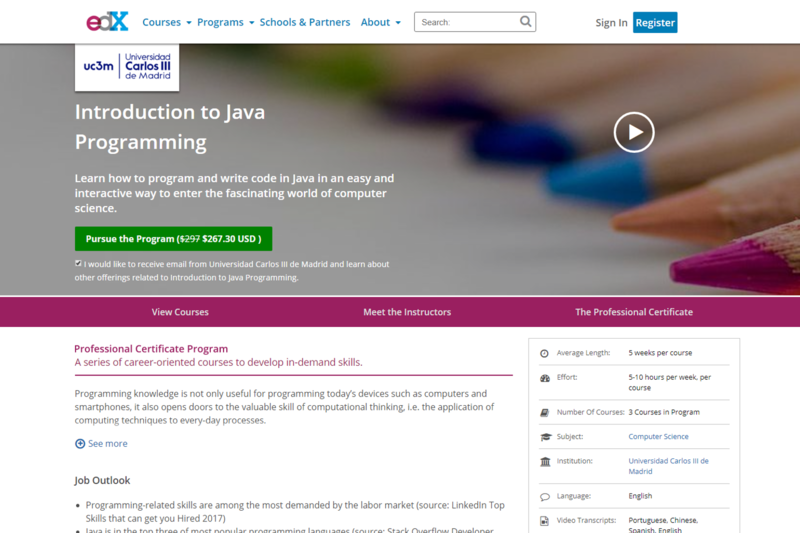
It drives applications like Twitter, Amazon or Minecraft:
The significance of Java as a programming language strongly increases.
This is also because of the huge number of Android apps (estimated at more than 3 million) which are based on Java.
Reason enough to deal with Java and to learn the popular coding language!
But which Java course is right for you?
3 Ways to Learn Java Online
In this overview, we explore 3 different ways to learn Java:
We show each option below and explain what the differences are.
(Want to jump directly to all 100+ Java online courses in our directory? Continue here.)
But before we start: What is "Java" anyway?
Java: A Special Programming Language
The feature that distinguishes Java from other programming languages is that it is platform independent.
An ordinary software must be adapted to the operating system on which it is used. A program for a Windows computer, for example, does not run under Linux. The idea behind Java is to lift this restriction.
The trick is that a separate runtime environment, called Java Runtime Environment, is designed for each operating system that Java will run in - for example, Windows, Unix or Linux.
Java is also an object-oriented programming language. You can create different objects and then combine them, resulting in a simplification of the software.
Sounds complicated? If you do join a Java course, you will understand it soon!
(Please note: Java is different from JavaScript. The latter is a scripting language for web browsers.)
Many applications, booming Android Apps
Since Java is running on almost all operating systems, there are many possible applications.
There are Java desktop applications, working like a regular computer program. In addition, Java is great for web applications. Put simply, Java is mainly used in the backend of websites (i.e. what happens on the server side). Moreover, there are so-called Java applets, small programs that are executed in the web browser.
Java also gets increasingly important for mobile devices. Apps for Android smartphones are almost always based on Java.
So Java is one of the main coding languages. But how exactly can you learn Java yourself?
THE 3 LEARNING OPTIONS:
1.) YouTube Tutorials: Get a Flavor of Java
With YouTube you can get a first impression. The teaching style is casual. But be careful: Not every "expert" uploading videos is always correct about the content. A structured teaching concept is also missing sometimes. And of course, certificates are not available.
Conclusion: Can give a flavor of Java to beginners; however, less suitable for a comprehensive, well-structured training.
Selected examples:
2.) Online Coding Boot Camps: Interactive Java Training for Practical Applications
Some online course providers specialize in coding. These boot camps and similar providers give you a focused training in programming skills. It´s a practice-oriented training that can be used on the job quickly, and it involves writing lots of Java code yourself. Often the courses are fee-based.
Conclusion: Focused practical training for fast coding skills; less detailed explanation of theoretical concepts.
Selected examples:
3.) Video Courses (MOOCs): Comprehensive Online Learning, Often Free
With MOOCs (massive open online courses), university-level content is delivered over the Internet. The courses come from universities that ensure a certain quality. With MOOCs, you can often learn for free, certificates (if required) are fee-based.
Conclusion: Comprehensive programming training from top universities. More detailed video lessons compared to the coding boot camps.
Selected examples:

Which Java Course is Best for You?
For beginners: If you want to take a first tour of Java, you can get a good impression with Youtube tutorials. You can still opt for a "real" course later.
For practitioners: If you need Java for your job and have a firm plan to learn it as quickly as possible, the coding boot camps can be a good option for you.
For future web developers: Do you want to spend more time with Java and plan to use it in web development later? Or do you need a course certificate for your job applications? Check out the relevant MOOC courses.
For computer science students: You can support your own CS studies with Java MOOCs or coding courses to get a firm grasp of Java.
What´s your experience? Let us know!
Edukatico is Your Search Portal for Online Courses
Find thousands of online courses from 22 subject areas in our directory. The computer science courses are listed here.
With our free Course Manager, you can organize your online learning and set up your individual learning schedule.
Are you interested in online courses? Subscribe to our newsletter here. And follow us on Facebook or Twitter!